Supporting Mental-health
Overview of myHappymind
We are proud to be a part of the myHappymind Family!
As a whole school program grounded in science and dedicated to building positive mental wellbeing, myHappymind helps children understand how their brains work and creates a culture that helps to build children's resilience, confidence, and self-esteem. myHappymind also teaches the children how to self-regulate and manage their emotions in stressful times, allowing them to be their very best selves!
Learn more here: https://myhappymind.org/
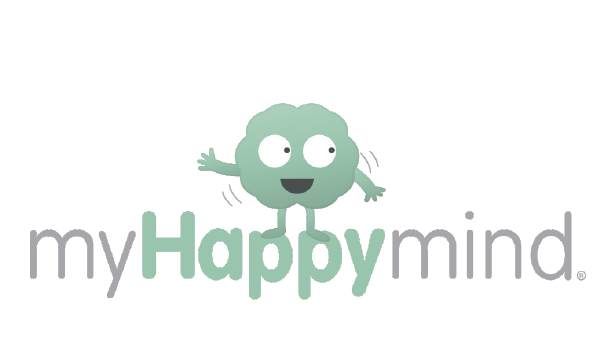
myHappymind Module Descriptions
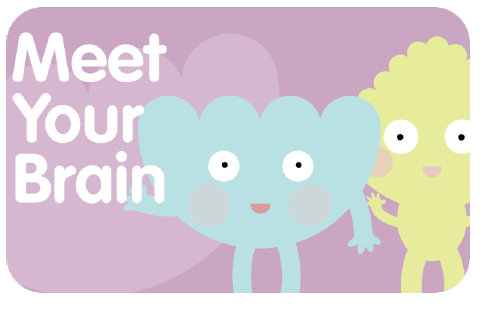
•Meet Your Brain: Understanding how your brain works and how to ensure we look after it so that we can manage our emotions and be at our best. Growth mindset is a key part of this too.

• Celebrate: Understanding your unique character strengths and learning to celebrate them. This is a fantastic module for building self-esteem.
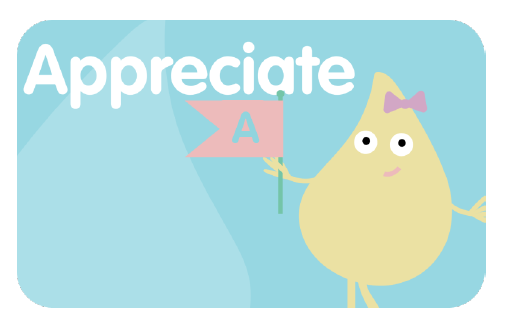
• Appreciate: Understanding why gratitude matters and how you can develop gratitude as a habit. Gratitude is key to well-being and resilience and we're all about making it a habit!
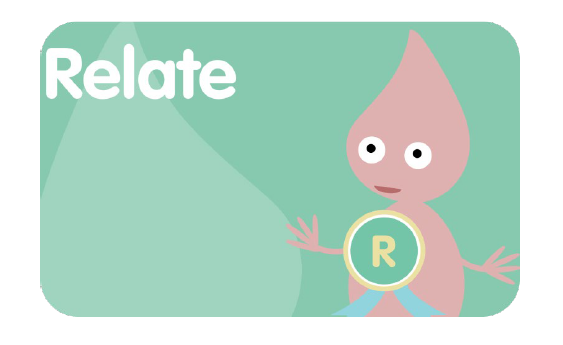
• Relate: Understanding why positive relationships matter and how to build them. We're focussed on the building blocks of good relationships and friendships.
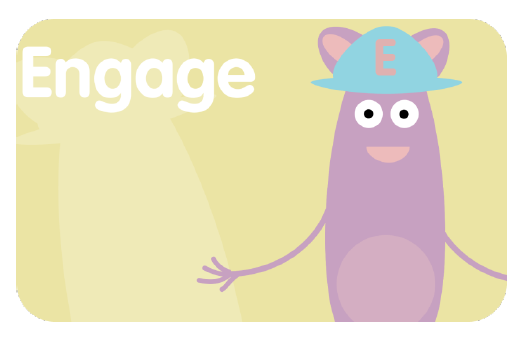
• Engage: Understanding how to set meaningful goals that matter and how to keep resilient in times of challenge. This module is all about building self-esteem and resilience too.
myHappymind is a mental health and well-being programme to support children in learning habits to support their own mental health. It does also cover all the mandatory objectives from the DfE Relationship Education Curriculum and also around 70% of the PSHE objectives.
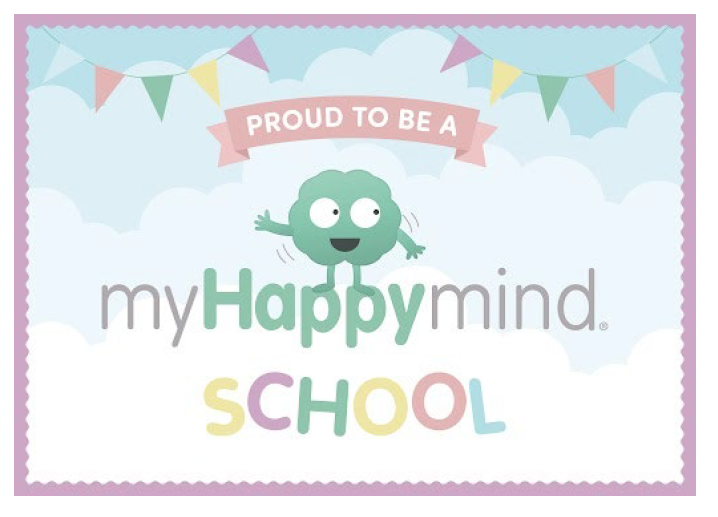
Parent App
Find information about the parent app here. If you are a parent, ask in school for our unique access code. https://myhappymind.lpages.co/myhappymind-parent-app-introduction/
TOP TIPS FOR HOW YOU CAN SUPPORT YOUR CHILD'S MENTAL HEALTH
Day to day
Our everyday habits are important to our mental health, just as they are to our physical health. Here are a few suggestions to help your child develop good habits.
Think about the five ways to wellbeing
Are there things you can encourage them to do, or do together, each day? Please see here for more information about the five ways to wellbeing.
Talk openly about mental health
Just as you might encourage them to eat fruit and veg to keep their bodies healthy (and model this behaviour yourself), talk openly about, for example, staying connected with others or being physically active in order to take care of our minds.
Model good habits
Children often learn from copying what they see around them. If you are taking care of your own mental health, it’s easier for them to see what good habits look like.
Think about phone usage – both theirs and yours
We don’t fully understand the impact of social media on our mental health but using phones and laptops can impact on our sleep, which is important to our mental health.
We’re also more likely to listen to one another if we’re not distracted by technology.
Notice any changes in your child’s behaviour
Young people tell us how they’re feeling in many ways, not always verbally.
Learning what is normal for your child makes it easier to notice when things change, and if this might be a sign that they’re struggling.
When times get tough
Sometimes you might worry about your child’s mental health. While you might need to speak to a member of the Inclusion Team or your GP for advice, here are a few things you can do if you’re worried.
Let your child know that you’re concerned
Explain why you feel that way, for example if you’ve noticed they haven’t been interested in activities they usually enjoy.
Use activities that you do together to have conversations about how they are doing
Talking whilst doing something together, side-by-side, such as cooking, can help them share their feelings more easily than a face-to-face conversation.
Let them know that struggling sometimes is normal and nothing to be ashamed of
Tell them about the mental health spectrum and that we all, including you, go up and down the scale throughout our lives. Reassure them that talking about difficult feelings with the people we trust is a brave thing to do.
GOOD MENTAL HEALTH
It is important that everyone looks after their mental health and well-being. There are many things you can do every day to improve and maintain your mental health.
Every day we try to eat healthily, take exercise and brush our teeth, all to keep ourselves physically healthy. Well, doing something every day to keep your mind healthy is just as important.
Watch the video to find out what good and poor mental health is and what you can do about it.
Click on the links below for good mental health activities:
WELLBEING ZONE

Grounding and Calming Techniques: View Here
Using Play to Support Children: View Here
Wellbeing Support Stoicism: View Here
Tip 1 Understanding Worry: View Here
Tip 2 Helping An Anxious Child: View Here
Tip 3 Coping Through Unsettling Times: View Here
Tip 4 Wellbeing-Coping With Anxiety: View Here
Breath and Body: listen Here
SUPPORTING FAMILIES WITH MENTAL HEALTH AND WELLBEING
Parent Support Leaflet: View Here
Urgent Mental Health Support: View Here
‘Together Again’ Calendar: View Here
Young Carers Newsletter : View Here
Parents only link : View Here
Health and Wellbeing Information Sheet: View Here
Activity Programmes: View Here
Anna Freud National Centre for Children and Families: View Here
Mind up Website: View Here
This Won’t Be Forever Poster: View Here
Suggestions To Keep Busy : View Here
Mental Health Apps : View Here
Physical Wellbeing : View Here
Mental Health Helplines : View Here

PHYSICAL ACTIVITY AT HOME
School’s Out Get Active : View Here
Video games that keep your child active : View Here
Lean Beans Healthy Lifestyle : View Here
MS Teams Login Process : View Here
Physical Activities : View Here
Activity Programmes: View Here
Change for Life : View Here
Premier Education : View Here
BBC Get Inspired : View Here
Zumba Kids Dance : View Here

HAVE A BRAIN BREAK...OR TWO!
Brain breaks for children: View Here
How brain breaks can help kids with homework: View Here
Why are brain breaks important for kids? : View Here

Wellbeing Advice
One of the most common effects of staring at back-lit screen for long periods of time is eye strain. Symptoms of eye strain include:
Dry eyes
Headaches
Fatigue
Blurred vision
This happens for two reasons. The first is that when we look at a screen, our blink rate drops by about 50%. Blinking is what keeps our eyes hydrated, and not doing so can result in a dry, gritty feeling. the second is muscle fatigue. If focus is maintained for long periods, the muscles controlling the lens can become overworked and tired.
Please download our poster, designed to help you and your children take better care of their eyes and bodies. View Here
